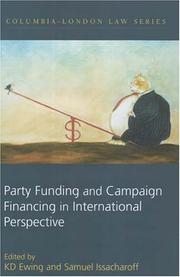| Listing 1 - 4 of 4 |
Sort by
|
Book
ISBN: 9781107654549 1107654548 1107038707 1316308863 1316288110 1139839330 9781139839334 9781107038707 Year: 2015 Publisher: Cambridge : Cambridge University Press,
Abstract | Keywords | Export | Availability | Bookmark
 Loading...
Loading...Choose an application
- Reference Manager
- EndNote
- RefWorks (Direct export to RefWorks)
Twenty-five years after the fall of the Berlin Wall, the democratic ascendency of the post-Soviet era is under severe challenge. While fragile democracies in Eastern Europe, Africa, and East Asia face renewed threats, the world has witnessed the failed democratic promises of the Arab Spring. What lessons can be drawn from these struggles? What conditions or institutions are needed to prevent the collapse of democracy? This book argues that the most significant antidote to authoritarianism is the presence of strong constitutional courts. Distinct in the third wave of democratization, these courts serve as a bulwark against vulnerability to external threats as well as internal consolidation of power. Particular attention is given to societies riven by deep divisions of race, religion, or national background, for which the courts have become pivotal actors in allowing democracy to take root.
Constitutional history --- Democracy --- New democracies --- Constitutional courts --- Histoire constitutionnelle --- Démocratie --- Nouvelles démocraties --- Cours constitutionnelles --- Constitutional history. --- Democracy. --- New democracies. --- Constitutional courts. --- Constitutional law. --- Constitutional law --- Constitutional limitations --- Constitutionalism --- Constitutions --- Limitations, Constitutional --- Public law --- Administrative law --- Courts, Constitutional --- Courts, Supreme --- Supreme courts --- Courts of special jurisdiction --- Courts of last resort --- Countries, Newly democratic --- Democracies, New --- Democratic states, New --- Emerging democracies --- Nations, Newly democratic --- New democratic states --- Newly democratic states --- States, Newly democratic --- Democratization --- Newly independent states --- Self-government --- Political science --- Equality --- Representative government and representation --- Republics --- Constitutional history, Modern --- History --- Interpretation and construction
Book
ISBN: 019767478X 0197674763 0197674771 Year: 2023 Publisher: New York, NY : Oxford University Press,
Abstract | Keywords | Export | Availability | Bookmark
 Loading...
Loading...Choose an application
- Reference Manager
- EndNote
- RefWorks (Direct export to RefWorks)
'Democracy Unmoored' focuses on populism's negative impact on democracies across the globe, covering not just wealthy democracies like the US and UK but countries like India, Argentina, Poland, and Brazil as well. In virtually every country experiencing a surge in populism, the populists' disregard for procedural norms is eroding the core institutions that uphold democracy. Sweeping in scope, this book provides a novel analysis of one of the defining trends in contemporary world politics.
Populism. --- Democracy. --- Self-government --- Political science --- Equality --- Representative government and representation --- Republics --- Politics and Government. --- Politics & government.

ISBN: 9781841135700 1841135704 Year: 2006 Publisher: Oxford Hart
Abstract | Keywords | Export | Availability | Bookmark
 Loading...
Loading...Choose an application
- Reference Manager
- EndNote
- RefWorks (Direct export to RefWorks)
#SBIB:324H42 --- #SBIB:324H43 --- Politieke structuren: verkiezingen --- Politieke structuren: politieke partijen --- Campaign funds --- Comparative government --- Assessments, Political --- Campaign contributions --- Campaign expenditures --- Campaign finance --- Election contributions --- Elections --- Political assessments --- Political campaigns --- Political parties --- Comparative political systems --- Comparative politics --- Government, Comparative --- Political systems, Comparative --- Political science --- Law and legislation --- Finance
Book
ISBN: 1472559797 1280801360 9786610801367 1847312535 Year: 2006 Publisher: Oxford Portland, Oregon Hart Publishing
Abstract | Keywords | Export | Availability | Bookmark
 Loading...
Loading...Choose an application
- Reference Manager
- EndNote
- RefWorks (Direct export to RefWorks)
This volume deals with questions of political party funding and campaign financing, issues which arouse controversy in many parts of the world. How are the central actors in the political arena supposed to gather the funds necessary to operate effectively on behalf of their chosen political ends? And, how may they spend money in furtherance of their political objectives? The aim of this volume, the first in a new series of Columbia University/London University collaborative projects, is to explore these issues in the specific context of a number of national settings.The studies presented here show that financing questions cannot be addressed independent of the constitutional conventions of the country, the nature of the political parties in the country, and the means of access to publication and the media in any given nation. The national studies in this volume reveal a rich diversity in the approach to regulation in Australia, Canada, the European Union, Japan, New Zealand, Quebec, the United Kingdom and the United States. The topicality of the issues considered is reflected in the fact that since the book was first mooted there have been major decisions of the US Supreme Court and the Supreme Court of Canada, as well as an investigation and report by the Electoral Commission in the United Kingdom, all of which have a direct bearing on the legal and policy issues discussed in this book
Campaign funds --- Comparative government. --- Law and legislation
| Listing 1 - 4 of 4 |
Sort by
|

 Search
Search Feedback
Feedback About UniCat
About UniCat  Help
Help News
News